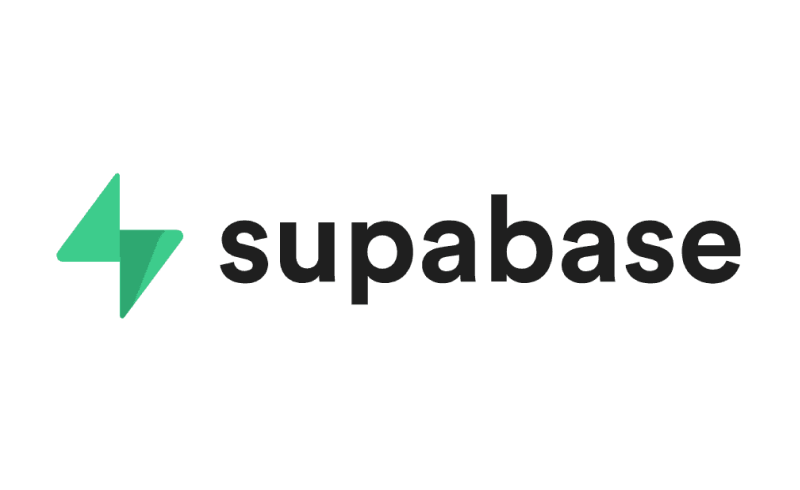Supabase is a backend-as-a-service (BaaS) platform tailored for organizations seeking a powerful alternative to Firebase. With a user-friendly interface and comprehensive features, Supabase simplifies database management, real-time updates, and facilitates secure user authentication.
What is Supabase?
Supabase is an open-source alternative to Firebase, designed for organizations that require a powerful and scalable backend infrastructure for their web and mobile applications. Developed to meet the needs of developers and businesses, Supabase provides a comprehensive Backend as a Service (BaaS) solution built on top of PostgreSQL, a popular open-source relational database management system.
Development came as a response to the growing demand for a flexible and scalable backend solution that adheres to modern development practices. The infrastructure empowers organizations to leverage the power of cloud computing and serverless architecture, speeding up development and deployment of web and mobile applications.
The project was inspired by the need for a developer-friendly alternative to existing backend solutions and was built upon the foundation of PostgreSQL, a comprehensive and feature-rich database system. By leveraging the power of PostgreSQL, Supabase inherits its reliability, data modeling capabilities, and extensibility, making it an ideal choice for organizations seeking a scalable backend infrastructure.
Supabase aims to democratize backend development by providing a developer-centric platform that combines the best of modern technologies with the familiarity of SQL and PostgreSQL. With its open-source nature, Supabase fosters community collaboration, enabling developers to contribute and improve the platform continually.
How does Supabase work?
Supabase is an open-source Backend as a Service (BaaS) solution, designed to empower organizations with a powerful alternative to proprietary platforms. It simply combines the reliability of PostgreSQL, a widely-used relational database management system, with a comprehensive set of tools for web development.
Supabase works by providing a RESTful API that developers can interact with, facilitating integration with frontend applications. This API simplifies the retrieval and manipulation of data, as well as authentication and authorization functionalities. By utilizing JavaScript and making HTTP requests to the Supabase API, developers can effortlessly create, read, update, and delete data within the PostgreSQL database.
To give real-time updates, Supabase leverages websockets, establishing a persistent connection between the frontend and the server. This means any changes made to the database are instantly propagated to connected clients, enabling real-time collaboration, notifications, and live updates in applications.
Features of Supabase
Supabase is a comprehensive backend platform designed to facilitate the rapid development and scalability of modern web and mobile applications. When making use of a suite of high-level features, developers can simplify operations and improve the functionality of their applications with ease.
| Real-time database | Supabase offers a real-time database powered by PostgreSQL, so organizations can build applications with live data updates. It provides instant synchronization of data changes between the client and server, real-time collaboration and seamless user experiences. |
| Authentication and authorization | With Supabase, organizations can easily implement user authentication and authorization mechanisms in their applications. It offers secure authentication methods, including email/password, third-party providers, and JSON Web Tokens (JWT). Role-based access control allows granular control over data access, making sure that only authorized users can perform specific actions. |
| Serverless functions | Supabase integrates serverless functions, enabling the execution of custom backend logic without managing servers. Organizations can create and deploy functions that respond to events or handle API requests, providing scalability and flexibility in application development. |
| Real-time subscriptions | Supabase simplifies real-time data updates through its real-time subscriptions feature. Developers can subscribe to changes in database tables or specific queries and receive instant updates whenever relevant data is modified. This functionality is crucial for building responsive applications that reflect real-time changes to users. |
| RESTful APIs | Supabase offers RESTful APIs to interact with the database and perform CRUD (Create, Read, Update, Delete) operations. This helps organizations to access and manipulate data securely from their applications, facilitating seamless integration and data management. |
| Stored procedures and triggers | Supabase supports the use of stored procedures and triggers in PostgreSQL, so organizations can define custom database logic. Stored procedures facilitate the execution of pre-defined routines, while triggers automate actions based on specified events or data changes. This improves the versatility and extensibility of database operations. |
| Data validation and constraints | Supabase provides data validation and constraint mechanisms. Organizations can define data types, apply constraints such as uniqueness and referential integrity, and enforce rules to ensure data integrity and consistency within the database. |
| Full-text search | Supabase integrates full-text search capabilities, facilitating advanced text-based searches on their data. With support for indexing, relevance ranking, and filtering options, users can quickly retrieve relevant information based on search queries. |
| Scalability and performance | Supabase leverages PostgreSQL’s scalability and performance features to handle large amounts of data and high user loads. Organizations can scale their applications seamlessly, leveraging the underlying infrastructure to deliver efficient and responsive experiences. |
| Security and compliance | Supabase prioritizes security and compliance with features such as encrypted data storage, secure authentication mechanisms, and role-based access control. It adheres to industry-standard practices and regulations, ensuring data protection and privacy. |
Who uses Supabase?

Airbnb, a leading online marketplace for vacation rentals and experiences, uses Supabase to power their real-time data needs. When integrating Supabase, Airbnb gets access to the efficient data synchronization across their platform, letting hosts and guests receive instant updates on availability, bookings, and notifications.

Canva, a popular graphic design platform, relies on Supabase for robust backend capabilities. With Supabase, Canva facilitates simplified storage and retrieval of user-designed templates, images, and assets, letting users collaborate in real-time and access their work across multiple devices.
The unique advantages of Supabase for organizations
Supabase has become a preferred solution for many organizations seeking efficient, secure, and flexible database management systems. As a platform built on proven technologies, Supabase brings together a suite of features that address the core needs of modern applications from scalability to cost-efficiency.
Scalability and performance
With Supabase, organizations can enjoy scalable and performant applications. Leveraging PostgreSQL as its powerful underlying database, Supabase offers impressive scalability to handle growing data needs. Its architecture optimizes query execution, leading to efficient data retrieval and superior performance for applications even at scale.
Data security and access control
Supabase prioritizes data security and provides robust access control mechanisms. It offers granular control over user authentication and authorization, so that sensitive data is securely managed. Organizations can implement fine-grained data access controls, protecting their valuable information and maintaining compliance with privacy regulations.
Developer-friendly infrastructure
Supabase offers a developer-friendly infrastructure, empowering teams to focus on building applications rather than managing complex backend systems. With its easy-to-use APIs and SDKs, developers can rapidly prototype, build, and deploy applications. Supabase also integrates with popular frontend frameworks, enabling a smooth development experience.
“With its open-source nature, Supabase fosters community collaboration, enabling developers to contribute and improve the platform continually.”
Open-source flexibility
Supabase makes use of the power of open-source, providing organizations with flexibility and customization options. Being an open-source project, it helps developers to contribute, modify, and extend its functionalities as per their specific requirements. This flexibility lets organizations tailor Supabase to their unique needs and leverage a vibrant community for support.
Integration with existing infrastructure
Supabase integrates with existing infrastructure, making it an ideal choice for organizations. It can be easily integrated with legacy systems, databases, and other services, smoothing transitions and minimizing disruption to existing workflows. This integration capability ensures compatibility and facilitates the adoption of Supabase within organizations.
Cost-effective solution
Supabase offers a cost-effective solution for organizations seeking powerful backend capabilities. By utilizing open-source technologies and providing flexible pricing options, Supabase reduces infrastructure costs while delivering reliable and scalable backend services. Organizations can optimize their budgets without compromising on performance or security.
Notable organizations using Supabase

Shopify, a renowned eCommerce platform, incorporates Supabase to enhance their data management and scalability. Supabase empowers Shopify merchants to efficiently handle large volumes of product listings, inventory management, and customer data, leading to smooth operations and improved user experiences.

Reddit, a prominent social news aggregation and discussion platform, harnesses Supabase for real-time data updates and user interactions. With Supabase, Reddit users experience instantaneous notifications, upvote counts, and comment updates, fostering an engaging and dynamic community-driven platform.

Coursera, a leading online learning platform, integrates Supabase to provide a personalized learning experience to millions of learners worldwide. With Supabase’s real-time capabilities, Coursera delivers instant progress tracking, personalized course recommendations, and collaborative learning features.
Considerations and downsides of Supabase
Despite its various strengths, Supabase presents certain challenges and limitations that could influence its adoption in certain scenarios. Each of these factors needs to be carefully considered to determine if Supabase aligns well with an organization’s technical strategy and resource availability.
| Limited database support | Supabase primarily relies on PostgreSQL as its database backend, which may be a limitation for organizations that require support for other database management systems. While PostgreSQL is powerful and versatile, organizations with specific database requirements may find themselves restricted by Supabase’s limited support for alternative databases. |
| Learning curve for non-technical users | Supabase is designed to let developers and technical users with its rich set of features and functionalities. However, for non-technical users or organizations with limited technical resources, there may be a steep learning curve to effectively utilize Supabase. The platform’s complexity and technical nature may require additional time and resources to onboard and train non-technical team members. |
| Hosting and infrastructure management | Although Supabase offers a serverless architecture, which minimizes the need for infrastructure management, organizations still need to consider hosting and deployment aspects. While Supabase simplifies many backend tasks, organizations will still need to handle deployment, scalability, and server management, which may require additional expertise or resources. |
| Dependency on external services | Supabase relies on various external services and technologies to provide its full range of features. While this means Supabase offers a comprehensive set of functionalities, it also introduces a level of dependency on these external services. Any disruption or changes to these services may impact the performance and reliability of Supabase-based applications. |
| Community and ecosystem maturity | Compared to more established platforms, the Supabase community and ecosystem are relatively young. While Supabase has gained traction and popularity, the availability of community resources, third-party integrations, and plugins may not be as extensive or mature as those of more established alternatives. This may result in limited community support or a narrower range of available extensions and integrations. |
| Limited third-party integrations | While Supabase has seen growth in its ecosystem, the availability of third-party integrations may still be more limited compared to more established platforms. This could potentially restrict organizations that rely heavily on specific integrations or require seamless interoperability with a wide range of tools and services. Although Supabase offers its own set of features and integrations, organizations should carefully evaluate the compatibility and availability of third-party integrations that are essential to their workflows. |

